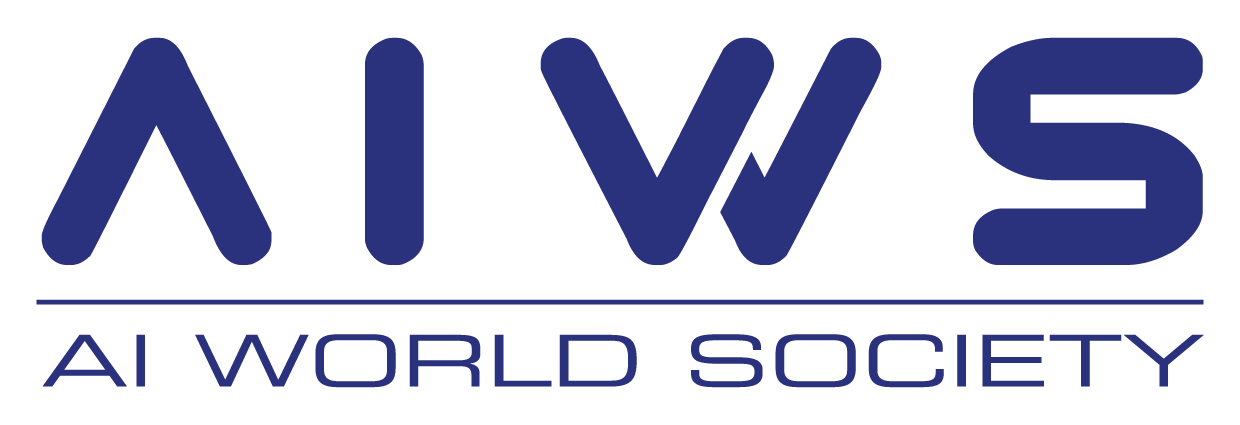
by dickpirozzolo | Jan 28, 2018 | News
Boston — The Boston Global Forum and Michael Dukakis Institute for Leadership and Innovation will recognize two prominent world leaders for their role in enhancing the capability of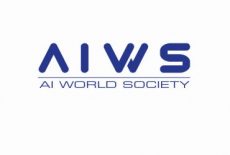 Artificial Intelligence or AI in the context of human values and for the benefit of mankind.
Artificial Intelligence or AI in the context of human values and for the benefit of mankind.
“The World Leader in AI World Society” award and the honoree for “Distinguished Innovation Leader” will be conferred upon the recipients at the annual meeting of the Artificial Intelligence World Society (AIWS) on April 25th at the Harvard Faculty Club, Cambridge, Massachusetts.
Tuan Nguyen, Boston Global Forum CEO and AIWS project director, stated, “’The World Leader in AI World Society’ award is open to leaders in numerous fields including government, politics, business or technology and will be awarded annually.”
He added, “The honor of ‘Distinguished Innovation Leader’ is open to government leaders, writers, inventors, and businesspeople whose contributions and innovations have enhanced, or reformed the politics, society, humanity, compassion, prosperity and security for the people of their nation. Their accomplishments may date as far back as 1980. The honoree will also receive a bronze plaque to affix to their home or place of business.”
Those interested in the future of AI and its impact on global society are urged to submit nominees and accomplishments, along with supporting documentation to [email protected].”
AIWS is a new initiative established by the Michael Dukakis Institute for Leadership and Innovation on November 22, 2017 as a way to build a social model that will make Artificial Intelligence (AI) safe, trustworthy, transparent, and humanistic. In 2018, AIWS will focus on and build Ethical Frameworks for AI Norms and Standards.
“AIWS is not an organization but rather a set of ideas, concepts, standards, norms, models, and innovations,” said Nguyen who emphasized, “This is an open project. We encourage leaders and influentials with an interest in AI to join in the effort and we invite the participation of scholars, government and business leaders, technologists, artists, and students.”
Former Massachusetts Governor Michael Dukakis noted, “Artificial Intelligence (AI) is changing the world we live in, from work to recreation, from healthcare to education, from governance to social interaction. AI applications are growing in number and usefulness, as the technology works its way into nearly every aspect of our lives. Understanding the relationship between AI and society from an ethical perspective is a must. Our goal is to encourage informed thinking, so that AI can contribute to the good of society—now and well into the future.”
The unpredictability of the Internet, computer operating systems, networks, and computer applications have often led to cyber security failures. “AI’s impact on society suggests a need to establish technical standards, institutions, and norms to ensure AI’s safe implementation and give it an ethical foundation,” according Gov. Dukakis who will organize roundtable discussions that include policymakers, AI developers, thought leaders, innovators, artists, and leading AI authorities.
The initiatives are being managed by the AIWS research team in Greater Boston, and worldwide through email, live seminars and forums, the AIWS Newsletter, discussion on Minds.com and social networking. In addition, Boston Global Forum and the Michael Dukakis Institute’s Ethical Framework for Standards and Norms for AIWS will be presented to world leaders as part of its BGF-G7 Summit Initiative. This year, Canada will host the G7 Summit in June 2018, in Charlevoix, Quebec.
Scholars and thought leaders from the following organizations, among others, are expected to contribute to AIWS’s work: Minds.com, Google, Intel, Political Science Department – MIT, MIT Media Lab, MIT – Department of Neuroscience, Harvard Kennedy School, Harvard Medical School, Ethics Institute – Northeastern University, Computer Science Department – Tufts University, World Leadership Alliance-Club de Madrid, former presidents of European countries, Viettel, SunViet, VietNamNet, Vietnam Report, Vietnam Cheo Theatre, and Vietnam Digital Association, and Vietnam Ministry of Public Security.
For Editorial Inquiries Contact Dick Pirozzolo [email protected] 617-959-4613
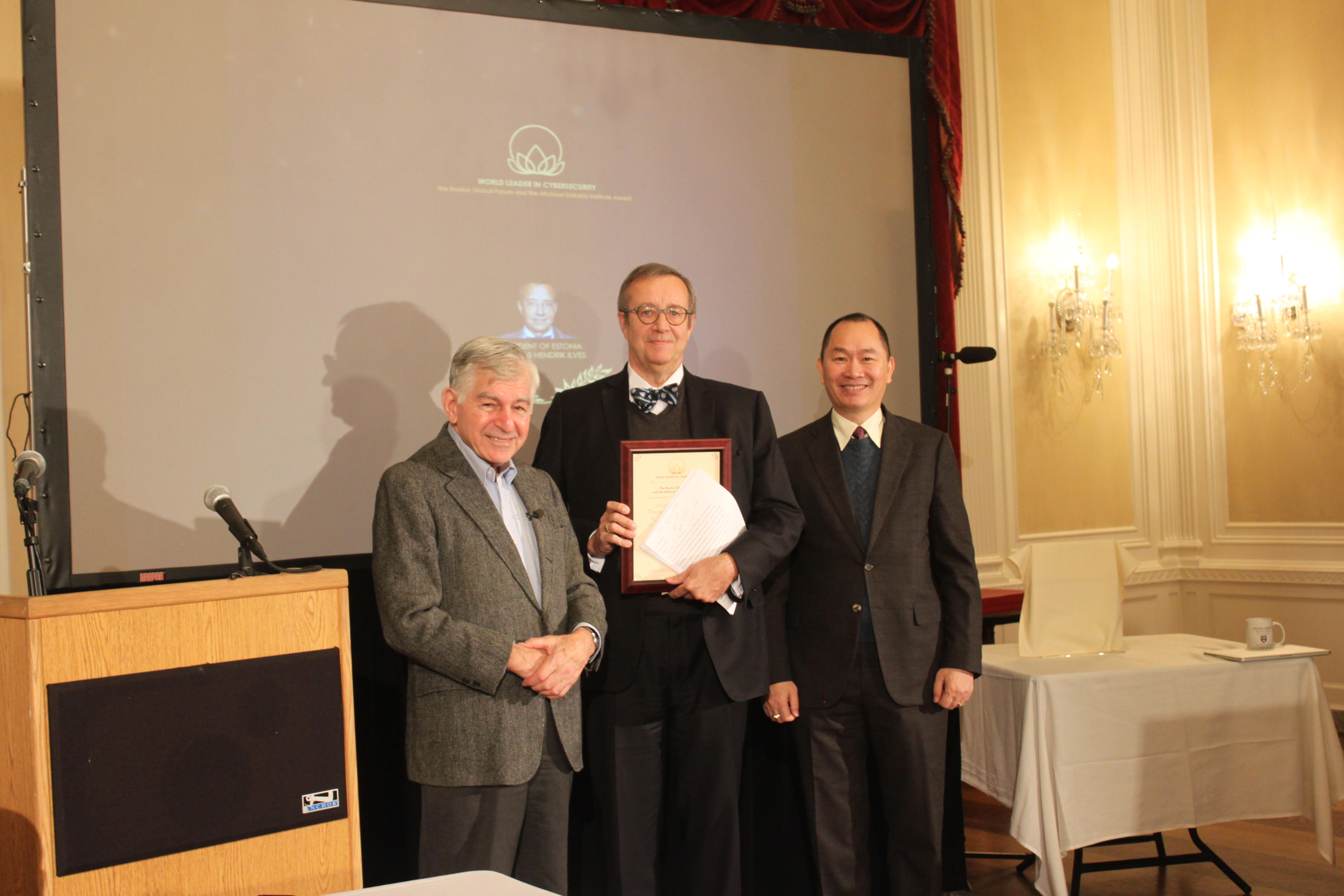
by dickpirozzolo | Dec 17, 2017 | Global Cyber Security Day
By Dick Pirozzolo, Boston Global Forum Editorial Board
Public policy rather than gee-whiz technology enhances cybersecurity
Toomas Hendrik Ilves, the former president of Estonia, was named World Leader in Artificial Intelligence and International Cybersecurity by the Boston Global Forum and the Michael Dukakis Institute for Leadership and Innovation. The award was presented to him at the third annual Global Cybersecurity Day conference held at Harvard University on December 12th 2017.
Pres. Ilves was recognized for fostering his nation’s achievements in developing cyber-defense strategies, and for establishing Estonia’s pre-eminence as a world leader in cyberspace technology, defense and safe Internet access. Indeed, Estonia’s cybersecurity and access principals that focus on assured identity in every transaction have become a model for other nations around the world.
Pres. Ilves, who is currently affiliated with Stanford University, was also recognized for his leadership before the United Nations, calling for greater urgency in combating the climate change, the need for safety of the Internet, and the plight of migrants and refugees – especially children.
A leader in cybersecurity
Recognizing Pres. Ilves for his contributions, Michael Dukakis, chairman of the Boston Global Forum and a former Massachusetts governor, stated, “We 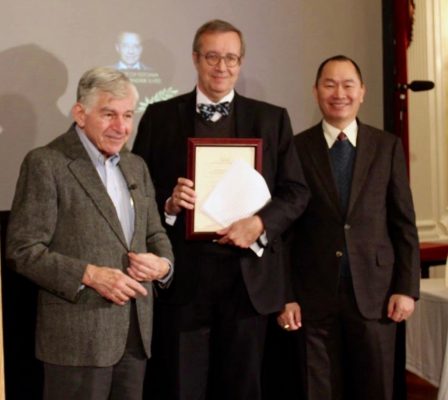 believe we are kindred spirits in our pursuit of a world in which we share in the concern for our fellow citizens worldwide. I also believe the Boston Global Forum and the Michael Dukakis Institute for Leadership and Innovation can play a vital role in helping you communicate your message and inspire others by participating with leading thinkers and scholars from Harvard and MIT who share your vision for a clean, safe and transparent Internet.”
believe we are kindred spirits in our pursuit of a world in which we share in the concern for our fellow citizens worldwide. I also believe the Boston Global Forum and the Michael Dukakis Institute for Leadership and Innovation can play a vital role in helping you communicate your message and inspire others by participating with leading thinkers and scholars from Harvard and MIT who share your vision for a clean, safe and transparent Internet.”
During Pres. Ilves’s term term in office, Estonia became a world leader in cybersecurity-related knowledge. The country now ranks highest in Europe and fifth in the world in cybersecurity, according to the 2017 cybersecurity index, compiled by the International Telecommunication Union. The country also hosts the headquarters of the NATO Cooperative Cyber Defense Centre of Excellence.
Also honored for contributing to the advancement of Artificial Intelligence and Cybersecurity was Prof. John Savage who was awarded Distinguished Global Educator for Computer Science and Security on the 50th Anniversary of Brown University’s Computer Science Department.
During his keynote address, Pres. Ilves pointed out that national defense was once based on distance and time, but today, “We are passing the limits of physics in all things digital,” while laws and governmental policies have failed to keep up. He reminded the delegates that 145 million adults recently had all their financial information stolen without intervention by the US government.
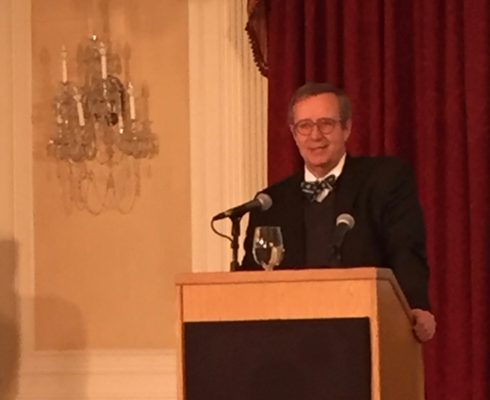 “Today 4.2 billion people are online using computers that are 3.5 billion times more powerful than when online communication started out 25 years ago with 3,500 academics who were using BITNET, the 1981 precursor to the modern Internet.”
“Today 4.2 billion people are online using computers that are 3.5 billion times more powerful than when online communication started out 25 years ago with 3,500 academics who were using BITNET, the 1981 precursor to the modern Internet.”
Protecting its citizens has always been the responsibility of the state and is part of our social contract. “We give up certain rights for protection, but we have been slow to get there in the digital world. When it comes to the cyber world, we are too focused on technology,” rather than policies that will enhance our safety on the Internet.
“Estonia’s cybersecurity technology is not advanced, but we are ahead on implementation,” he said adding, “There is a huge difference between what we do and other countries – our focus was not on the gee whiz technology,” but on implementation of a system that relies on positive identity, which is the foundation of the country’s cybersecurity program. Additionally, all bureaucratic dealings are online and, with assured identity, Estonia has eliminated the need to request personal information repeatedly. Once personal information is on file, Estonian law prohibits any agency from requesting that that information ever again. An Estonian can get his or her birth, obtain a driving license, alloy for a building permit and register for school without having to fill out the same information repeatedly.
This is in sharp contrast to the US. Pres. Ilves joked that even though he lives at the Silicon Valley, the center of advanced technology where Facebook, 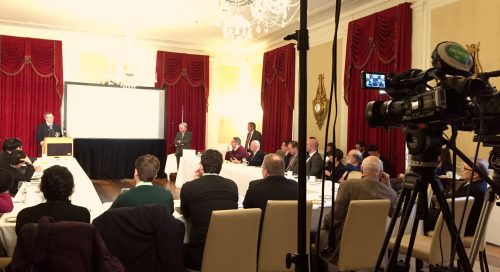 Google and Tesla are within a one mile radius, “When I went to register my daughter for school I had to bring an electric bill to prove I lived there. It struck me that everything I experienced was identical to the 1950s save for the photocopy.”
Google and Tesla are within a one mile radius, “When I went to register my daughter for school I had to bring an electric bill to prove I lived there. It struck me that everything I experienced was identical to the 1950s save for the photocopy.”
He continued, “When Estonia emerged out of the fall of the Soviet Union in 1991, “we were operating with virtually no infrastructure, even the roads built during the Soviet era were for military purposes. By 1995 to 96 [however] all schools were online with computer labs so that all student could have access to computers even though they could not afford to buy them.”
By the late 1990s Estonia determined, “The fundamental problem with cyber security is not knowing who you are talking to. So we started off with a strong identity policy; everyone living in Estonia has a unique chip-based identity card using two factor authentication with end-to-end encryption.” This is more secure than using passwords which can be hacked.
“A state-guaranteed identity program seems to be the main stumbling block for security elsewhere. My argument is that a democratic society, responsible for the safety of the citizens, must make it mandatory to protect them.” Moreover, Estonia’s mandatory digital identity offers numerous benefits, for example, “We don’t use checks in Estonia.”
Decentralized Data Centers
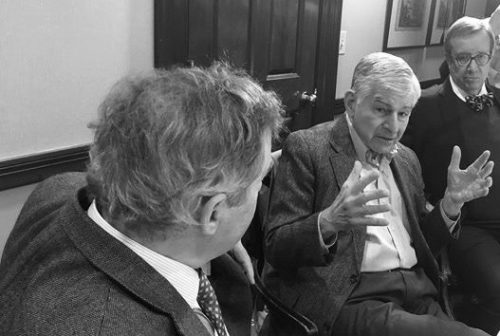 “In Estonia, we could not have a centralized database for economic reasons. Every ministry has its own servers, but everything is connected to everything else including your identity.” Even if someone breaks into the system, the person “is stuck in one room and cannot get into the rest of the system.”
“In Estonia, we could not have a centralized database for economic reasons. Every ministry has its own servers, but everything is connected to everything else including your identity.” Even if someone breaks into the system, the person “is stuck in one room and cannot get into the rest of the system.”
Known as X-Road, this decentralized system is the backbone of e-Estonia. Claim the developers, “It’s the invisible yet crucial environment that allows the nation’s various e-services databases, both in the public and private sector, to link up and operate in harmony. It allows databases to interact, making integrated e-services possible.”
The system is so well integrated that Pres. Ilves claims it streamlines submitting paperwork for various needs to a point where it saves every Estonian 240 working hours a year by not having to fill out tedious forms.
Nearby Finland has joined in implementing such a system along with Panama, Mexico, and Oman.
Pres. Ilves added that, Blockchain technology is used to store personal information to assure the integrity of the data. “I might not like it if someone sees my bank account or blood type, but if they do it is not as bad as changing my financial records or blood type – which cannot be done.”
Estonia further assures the safety of its data by having an extraterritorial server in Luxembourg where the information is duplicated outside its borders. As a result of its legal and policy approach to security, “Estonia is the most cyber secure country in Europe, Russia the most secure in Eurasia and China the most in Asia. Estonia is also the most democratic.”
International Cyber Agreements
Joseph Nye, Harvard University Distinguished Service Professor, Emeritus and former Dean of the Harvard’s Kennedy School of Government explored 
ways nations can develop cybersecurity and cyber-attack norms, drawing parallels between cyber and nuclear technology norms, threats and international agreements. “It took two decades to develop norms for nuclear war. We’re now about two decades into cyber depending on how you count.”
Nye recalled that cybersecurity problems emerged in the mid-1990s when web browsers became widely available sparking the “huge benefits and huge vulnerabilities” of cyberspace about two decades ago.
He noted, that with establishing norms to harness the destructive power of nuclear technology, “The first efforts centered around UN treaties.” though “Russia defeated UN-centered efforts after the Cuban missile crisis.”
Nye told some 40 delegates at the World Cybersecurity Day event, that the beginning of real efforts to set norms around nuclear technology, came with test ban treaties, which were essentially focused on environmental concerns over detonating nuclear bombs in the atmosphere. That came in the 1960s. “It wasn’t until the 1970s that SALT (Strategic Arms Limitation Talks) produced something that began to set constraints.”
Turning to cybersecurity, global efforts to limit cyberattacks by states, “especially against critical infrastructure” began in 2015 in a report taken to the UN Group of 20 the world’s most powerful economies made up of 19 nations and the European Union. In 2017, however, they failed to reach consensus due largely to difficulties between the US and Russia. China backed off as well.
Setting cyberspace norms
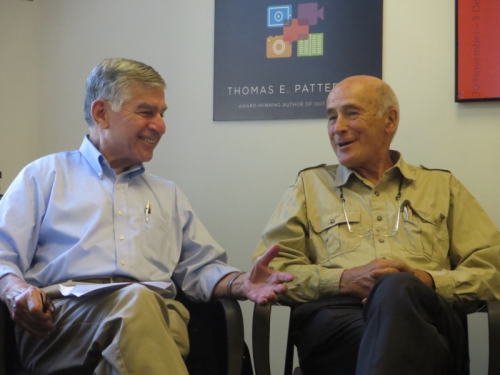 Nye explained that “a norm is a collective expectation of a group of actors. It is not legally binding, and differs from international law. Norms can also be common practices that develop from collective expected behavior and rules of conduct.”
Nye explained that “a norm is a collective expectation of a group of actors. It is not legally binding, and differs from international law. Norms can also be common practices that develop from collective expected behavior and rules of conduct.”
While large groups of nations have tended to achieve little in terms of establishing norms in cyberspace, bilateral agreements offer promise. “The US and China have very different views on Internet rules regarding [say] freedom of speech. For years the US corporations complained about cyber espionage being undertaken to steal American companies’ intellectual property and giving it to Chinese businesses,” Nye said, recalling that, at first there were denials but the issue became a top priority when the Edward Snowden affair let China off the hook. At that time China totally blocked IP theft.
The US further stated that it would sanction Chinese companies unless their government took a position against stolen IP. Then, with a US-China summit coming up 2015—the US made it clear that if the meeting was to succeed, intellectual property theft, had to stop because of its corrosive impact on fair trade. “Espionage is one thing, but corrupting the trade system is different than stealing other secrets.” What’s more, Internet espionage is, “quick, cheap and you don’t have to worry about your spy getting caught.”
Finally, when XI Jinping and President Obama met in September of 2015, China agreed to no longer acquire intellectual property. “While some IP spying continues on the margins, there has been a discernable reduction since the meeting,” said Nye.
The benefit of bilateral agreements Nye emphasized is, “They don’t stay in a box but become the kernel of the broader game of establishing wider norms,” noting that while broad multi-nation global agreements may have failed, bilateral agreement between states with very different views have succeeded. “Progress may not be made by a large global agreement such as convening 40 states. Finding ways states can negotiate concrete decisions between themselves and broadening them to encompass more nations is a much more plausible approach”
International Law for Cyberspace
 Nazli Choucri, Professor of Political Science, MIT and Director, Global System for Sustainable Development noted that, while it is a long way from norms to international law, it is especially important to recognize the important contributions of the Tallinn [Estonia] Manual 2.0 on International Law Applicable to Cyber Operations for Cyberspace Operations, to current thinking about order in a world of disorder.
Nazli Choucri, Professor of Political Science, MIT and Director, Global System for Sustainable Development noted that, while it is a long way from norms to international law, it is especially important to recognize the important contributions of the Tallinn [Estonia] Manual 2.0 on International Law Applicable to Cyber Operations for Cyberspace Operations, to current thinking about order in a world of disorder.
When reading the the four part Manual it should come as no surprise that the state and the state system serves as anchor and entry point for the entire initiative.
Part I is on general international law and cyberspace, and begins with Chapter 1 on sovereignty.
Part II focuses on specialized regimes of international law and cyberspace.
Part III is on international peace and security and cyber activities, and
Part IV on the law of armed conflict.
Each Part is divided into Chapter (some of which are further divided into Sections), and each Chapter consists of specific Rules. It is at level of Rules that the substantive materials are framed as explicit directives – points of law.
This approach — presented in the best tradition of linear text –records the meaning of each Rule, Rule by Rule and its connections to other Rules. A document of nearly 600 pages, the Manual amounts to a daunting task for anyone who wishes to understand it in its entirety, or even in its parts.. Further, the text-as-conduit may not do justice to what is clearly a major effort. It is difficult to track salient relationships, mutual dependencies, or reciprocal linkages among directives presented as Rules. For these reasons, researchers at MIT found ways of representing the content of the 600 pages of the Manual in several different visual representations that are derived from the text.
The purpose is to understand the architecture underlying the legal frame of the Tallinn Manual. One type of representation consists of network views ofthe Rules – all 154 of them in one visual form and in one page. And there are many more.

Source: Nazli Choucri and Gaurav Agarwal, “Analytics for Smart Grid Cybersecurity 2017 IEEE International Symposium on Technologies for Homeland Security, Waltham, MA. http://ieee-hst.org
No longer are we dealing with rather dry text form of equally dry legal narrative. Rather we are looking at colorful networked representations of how the various Rules connect to each other – and to some extent why. This brief summary does little justice to process or product. At the same time, however, it points to new ways of understanding the value of 600 pages of text.
Cybersecurity and Executive Order
By definition text undermines attention to feedback, delays, interconnections, cascading effects, indirect impacts and the like – all embedded deep text. This is true for Tallinn Manual 2.0 as it is for responses to Presidential Executive Order (EXORD 2017).
The text-form may be necessary, but it is not sufficient. In fact, it may create barriers to understanding, obscure the full nature of directives, and generate less than optimal results – all of which prevent good results. If there is a summary to be made, it is this Table.
Other avenues to cyber defense
Prof. Derek Reveron of the Naval War College said, “Cybersecurity challenges the way we think about domestic and foreign boundaries. The military looks outward but with cyber threats boundaries have less meaning.”
He added that effectively combating cyber threats can be hampered by “tension between intelligence agencies and Cyber Command which is charged with responding. Cyber Command might be able to attack ISIS in cyberspace, but then the intelligence community will lose assets. Attacks also needs clearance from Congress,” thus delaying action.
“Cybersecurity measures also challenge our idea of what’s public and what’s private,” said Reveron noting that cyberspace is monitored and run by corporate entities that are global not national—companies are more important than governments” in defending cyberspace, he said.
Additionally, it is difficult to isolate malicious cyberattacks to determine their source and privacy and freedom come into play as well when deploying cyber defensive measures outside the US. “In China and Russia, for example, internet freedom is a threat to authoritarianism,” he observed, adding, “Google had to give up some of its values in China that that it has in the US.”
Reveron underscored several practical cyber-defense rules of the road to consider:
- characterize the threshold for action and understand the adversaries’ thresholds for reactions
- to avoid escalation, governments should maintain the monopoly on cyber-attacks not companies
- critical infrastructure attacks will have a local impact, so if the power goes out in Cambridge, we need a connection between local and national responders
- within a country there must be collaboration across all entities—banks, telecom, retailers and the like
- practice comprehensive resilience to prepare municipalities and individual states for cyber attacks
- enhance the cybersecurity of developing countries by making their systems more resilient and their citizens more digitally savvy.
A recent paper on the subject Principles for a Cyber Defense Strategy by Derek S. Reveron, Jacquelyn Schneider, Michael Miner, John Savage, Allan Cytryn, and Tuan Anh Nguyen is available on the Boston Global Forum Website.
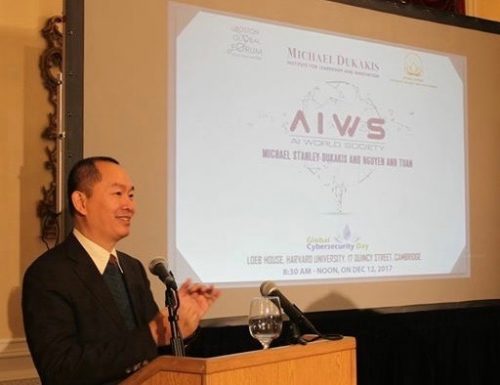 During the meeting, Tuan Nguyen introduced the launch of the Artificial Intelligence World Society, an offshoot of the Michael Dukakis Institute for Leadership and Innovation.
During the meeting, Tuan Nguyen introduced the launch of the Artificial Intelligence World Society, an offshoot of the Michael Dukakis Institute for Leadership and Innovation.
Global Cybersecurity Day was created to inspire the shared responsibility of the world’s citizens to protect the Internet’s safety and transparency. As part of this initiative, BGF and the Michael Dukakis Institute for Leadership and Innovation also calls upon citizens of goodwill to follow BGF’s Ethics Code of Conduct for Cyber Peace and Security (ECCC).
Boston Global Forum , a think tank with ties to Harvard University faculty, includes scholars, business leaders and journalists. BGF is chaired by former Massachusetts Gov. Michael Dukakis, a national and international civic leader and BGF’s cofounder As an offshoot of The Boston Global Forum, The Michael Dukakis Institute for Leadership and Innovation (MDI) was born in 2015 with the mission of generating ideas, creating solutions, and deploying initiatives to solve global issues, especially focused on Cybersecurity and Artificial Intelligence.
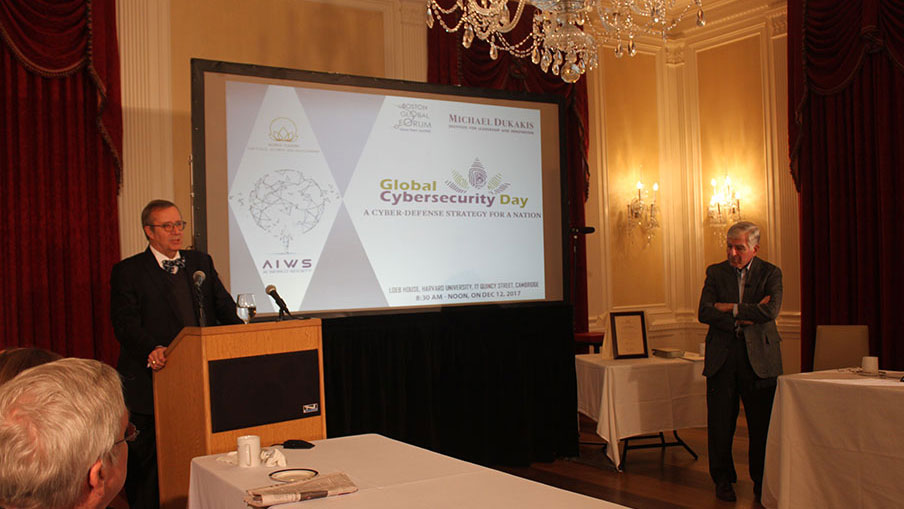
by dickpirozzolo | Dec 15, 2017 | News
Former Estonian president, Toomas Hendrik Ilves, was named World Leader in Artificial Intelligence and International Cybersecurity by the Boston Global Forum and the Michael Dukakis Institute for Leadership and Innovation, at the third annual Global Cybersecurity Day conference held at Harvard University on December 12th 2017.
Pres. Ilves was recognized for fostering his nation’s achievements in developing cyber-defense strategies for all nations, and for establishing Estonia’s pre-eminence as a world leader in cyberspace technology, defense and safe Internet access. Indeed, Estonia’s cyber security and access principals that focus on assured identity in every transaction have become a model for other nations around the world
Pres. Ilves, who is currently affiliated with Stanford University, was also recognized for his leadership before the United Nations, calling for greater urgency in combating the climate change, the need for safety of the Internet, and the plight of migrants and refugees – especially children.
A leader in cybersecurity
Recognizing Pres. Ilves for his contributions, Michael Dukakis, chairman of the Boston Global Forum and a former Massachusetts governor, stated, “We  believe we are kindred spirits in our pursuit of a world in which we share in the concern for our fellow citizens worldwide. I also believe the Boston Global Forum and the Michael Dukakis Institute for Leadership and Innovation can play a vital role in helping you to communicate your message and inspire others by participating with leading thinkers and scholars from Harvard and MIT who share your vision for a clean, safe and transparent Internet.”
believe we are kindred spirits in our pursuit of a world in which we share in the concern for our fellow citizens worldwide. I also believe the Boston Global Forum and the Michael Dukakis Institute for Leadership and Innovation can play a vital role in helping you to communicate your message and inspire others by participating with leading thinkers and scholars from Harvard and MIT who share your vision for a clean, safe and transparent Internet.”
During Pres. Ilves’s term as the Estonian president, his country became a world leader in cybersecurity-related knowledge. Estonia now ranks highest in Europe and fifth in the world in cybersecurity, according to the 2017 cybersecurity index, compiled by the International Telecommunication Union. The country also hosts the headquarters of the NATO Cooperative Cyber Defense Centre of Excellence.
Also honored for contributing to the advancement of Artificial Intelligence and Cybersecurity was Prof. John Savage who was awarded Distinguished Global Educator for Computer Science and Security on the 50 Anniversary of the Brown University Computer Science Department.
During his keynote address, Pres. Ilves pointed out that national defense was once based on distance and time, but today, “We are passing the limits of physics in all things digital,” while laws and governmental policies have failed to keep up. He reminded the delegates that 145 million adults recently had all their financial information stolen without intervention by the US government.
 “Today 4.2 billion people are online using computers that are 3.5 billion times more powerful than when online communication started out 25 years ago with 3,500 academics who were using BITNET, the 1981 precursor to the modern Internet.”
“Today 4.2 billion people are online using computers that are 3.5 billion times more powerful than when online communication started out 25 years ago with 3,500 academics who were using BITNET, the 1981 precursor to the modern Internet.”
Protecting its citizens has always been the responsibility of the state and is part of our social contract. “We give up certain rights for protection, but we have been slow to get there in the digital world. When it comes to the cyber world, we are too focused on technology,” instead of policies that will enhance our safety on the Internet.
“Estonia’s cybersecurity technology is not advanced, but we are ahead on implementation,” he said adding, “There is a huge difference between what we do and other countries – our focus was not on the gee whiz technology.” but rather implementation of a system that relies on positive identity, which is the foundation of the country’s cybersecurity program. Additionally, all bureaucratic dealings are online and, with assured identity, Estonia has eliminated the need to request personal information repeatedly. Once personal information is on file, Estonian law prohibits any agency from requesting that that information ever again. An Estonian can get a driving license, building permit and register for school without having to fill out the same information repeatedly.
This is in sharp contrast to the US. Pres. Ilves joked that even though he lives at the Silicon Valley, the center of advanced technology where Facebook,  Google and Tesla are within a one mile radius, “When I went to register my daughter for school I had to bring an electric bill to prove I lived there. It struck me that everything I experienced was identical to the 1950s save for the photocopy.”
Google and Tesla are within a one mile radius, “When I went to register my daughter for school I had to bring an electric bill to prove I lived there. It struck me that everything I experienced was identical to the 1950s save for the photocopy.”
He continued, “When Estonia emerged out of the fall of the Soviet Union in 1991, “we were operating with virtually no infrastructure, even the roads built during the Soviet era were for military purposes. By 1995 to 96 [however] all schools were online with labs so that all student could have access to computers even though they could not afford to buy them.”
By the late 1990s Estonia determined, “The fundamental problem with cyber security is not knowing who you are talking to. So, we started off with a strong identity policy; everyone living in Estonia has a unique chip-based identity card using two factor authentication with end-to-end encryption.” This is more secure than using passwords which can be hacked.
“A state-guaranteed identity program seems to be the main stumbling block for security elsewhere. My argument is that a democratic society, responsible for the safety of the citizens, must make it mandatory to protect them.” Moreover, Estonia’s mandatory digital identity offers numerous benefits, for example, “We don’t use checks in Estonia.”
Decentralized Data Centers
 “In Estonia, we could not have a centralized database for economic reasons. Every ministry had its own servers, but everything is connected to everything else including your identity.” Even if someone breaks into the system, the person “is stuck in one room and cannot get into the rest of the system.”
“In Estonia, we could not have a centralized database for economic reasons. Every ministry had its own servers, but everything is connected to everything else including your identity.” Even if someone breaks into the system, the person “is stuck in one room and cannot get into the rest of the system.”
Known as X-Road, this decentralized system is the backbone of e-Estonia. Claim the developers, “It’s the invisible yet crucial environment that allows the nation’s various e-services databases, both in the public and private sector, to link up and operate in harmony. It allows databases to interact, making integrated e-services possible.”
The system is so well integrated that Pres. Ilves claims it streamlines submitting paperwork for various needs to a point where it saves every Estonian 240 working hours a year by not having to fill out tedious forms.
Nearby Finland has joined in implementing such a system along with – Panama, Mexican, and Oman.
Pres. Ilves added that, Blockchain technology is to store personal information to assure the integrity of the data. “I might not like it if someone sees my bank account or blood type, but if they do it is not as bad as changing my financial records or blood type – which cannot be done.”
Estonia further assures the safety of its data by having an extraterritorial server in Luxembourg where the information is duplicated outside its borders.As a result of its legal and policy approach to security, “Estonia is the most cyber secure country in Europe, Russia the most secure in Eurasia and China the most in Asia. Estonia is also the most democratic.”
International Cyber Agreements
Joseph Nye, Harvard University Distinguished Service Professor, Emeritus and former Dean of the Harvard’s Kennedy School of Government explored 
waysnations can develop cybersecurity and cyber-attack norms, often drawing parallels between cyber and nuclear technology, norms, threats and international agreements. “It took two decades to develop norms for nuclear war. We are now about two decades on cyber depending on how you count.”
Nye recalled that cybersecurity problems emerged in the mid-1990s when web browsers became widely available sparking the “huge benefits and huge vulnerabilities” of cyberspace about two decades ago.
He noted, that with establishing norms to harness the destructive power of nuclear technology, “The first efforts centered around UN treaties.” through “Russia defeated UN-centered efforts after the Cuban missile crisis.”
Nye told some 40 delegates at the World Cybersecurity day event, that the beginning of real efforts to set norms around nuclear technology, came with test ban treaties, which were essentially focused on environmental concerns over detonating nuclear bombs in the atmosphere came in the 1960s. “It wasn’t until the 70s that SALT (Strategic Arms Limitation Talks) produced something that began to set constraints.”
Turning to cybersecurity, global efforts to limit cyberattacks by states, “especially against critical infrastructure” began in 2015 in a report taken to the UN Group of 20 of the world’s most powerful economies; 19 nations and the European Union. In 2017, however, they failed to reach consensus due largely to difficulties between the US and Russian and China backed off as well.
Setting cyberspace norms
 Nye explained that “a norm is a collective expectation of a group of actors. It is not legally binding, and differs from international law. Norms can also be common practices that develop from collective expected behavior and rules of conduct.”
Nye explained that “a norm is a collective expectation of a group of actors. It is not legally binding, and differs from international law. Norms can also be common practices that develop from collective expected behavior and rules of conduct.”
While large groups of nations have tended to achieve little in terms of establishing norms in cyberspace, bilateral agreements offer promise. “The US and China have very different views on internet rules regarding [say] freedom of speech. For years the US corporations complained about cyber espionage being undertaken to steal American companies’ intellectual property and giving it to Chinese businesses,” Nye said, recalling that, at first there were denials but the issue became a top priority when the Edward Snowden affair let China off the hook. At that time China totally blocked IP theft.
The US further stated that it would sanction Chinese companies unless their government took position against stolen IP. Then, with a US-China summit coming up 2015—the US made it clear that if the meeting was to succeed, intellectual property theft, had to stop because of its corrosive impact on fair trade. “Espionage is one thing, but corrupting the trade system is different than stealing other secrets.” What’s more, Internet espionage is, “quick, cheap and you don’t have to worry about your spy getting caught.”
Finally, when XI Jinping and President Obama met in September of 2015, China agreed to no longer acquire intellectual property.” While some IP spying continues on the margins, there has been a discernable reduction since the meeting.
The benefit of bilateral agreements Nye emphasized is that, “They don’t stay in a box but become the kernel of the broader game of establishing wider norms,” noting that while broad multi-nation global agreements may have failed, bilateral agreement between states with very different views have succeeded.
“Progress may not be made by a large global agreement such as convening 40 states. Finding ways states can negotiate concrete decisions between themselves and broadening them to encompass more nations is a much more plausible approach”
Other avenues to cyber defense
Prof. Derek Reveron of the Naval War College noted that, “Cybersecurity challenges the way we think about domestic and foreign boundaries. The military looks outward but with cyber threats boundaries have less meaning.”
He added that effectively combating cyber threats can be hampered by, “tension between intelligence agencies and Cyber Command which is charged with responding. Cyber Command might be able to attack ISIS in cyberspace, but then the intelligence community will lose assets. Attacks also needs clearance from Congress.”
“Cybersecurity measures also challenge our idea of what’s public and what’s private,” said Reveron noting that cyberspace is monitored and run by corporate entities that are global not national—companies more important than governments,” in defending cyberspace, he said.
Additionally, it is difficult to isolate malicious cyberattacks to determine their source and privacy and freedom come into play as well when it comes to cyber defensive measures outside the US. “In China and Russia, for example, internet freedom is a threat to authoritarianism,” he observed, noting, “Google had to give up some of the values in China that that it has in the US.”
Reveron underscored several practical cyber-defense rules of the road to consider:
- characterize the threshold for action and understand the adversaries’ thresholds for reactions
- to avoid escalation, governments should maintain the monopoly on cyber-attacks not companies
- critical infrastructure attacks will have a local impact. If the power goes out in Cambridge, we need a connection between local and national responders
- within a country there must be collaboration across all entities—banks, telecom, retailers and the like
- practice comprehensive resilience to prepare municipalities and individual states for cyber attacks
- enhance the cybersecurity of developing countries by making their systems more resilient and their citizens more digitally savvy.
A recent paper on the subject Principles for a Cyber Defense Strategy by Derek S. Reveron, Jacquelyn Schneider, Michael Miner, John Savage, Allan Cytryn, and Tuan Anh Nguyen is available on the Boston Global Forum Website.
 During the meeting, Tuan Nguyen introduced the launch of the Artificial Intelligence World Society, and offshoot of the Michael Dukakis Institute for Leadership and Innovation.
During the meeting, Tuan Nguyen introduced the launch of the Artificial Intelligence World Society, and offshoot of the Michael Dukakis Institute for Leadership and Innovation.
Global Cybersecurity Day was created to inspire the shared responsibility of the world’s citizens to protect the Internet’s safety and transparency. As part of this initiative, BGF and the Michael Dukakis Institute for Leadership and Innovation also calls upon citizens of goodwill to follow BGF’s Ethics Code of Conduct for Cyber Peace and Security (ECCC).
Boston Global Forum a think tank, with ties to Harvard University faculty includes scholars, business leaders and journalists, and is chaired by former Massachusetts Gov. Michael Dukakis, a national and international civic leader and BGF’s cofounder As an offshoot of The Boston Global Forum, The Michael Dukakis Institute for Leadership and Innovation (MDI) was born in 2015 with the mission of generating ideas, creating solutions, and deploying initiatives to solve global issues, especially focused on Cybersecurity and Artificial Intelligence
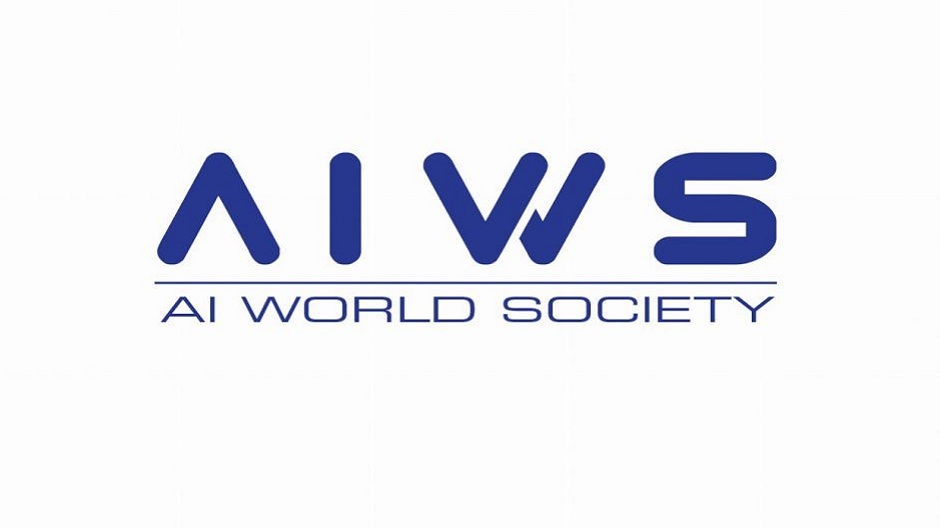
by dickpirozzolo | Nov 29, 2017 | News

AIWS is a world society dedicated to understanding AI and to positively influence its impact society
Gov. Michael Dukakis and Tuan Nguyen today announced the founding of the Artificial Intelligence World Society or AIWS, whose mission is to foster the ethical development, implementation and advancement of Artificial Intelligence to better serve the needs of all humanity worldwide.
In making the announcement, Nguyen said, “Artificial Intelligence is all around us in ways small and big—from using our iPhones to command Siri to solving complex problems in business, manufacturing, education, government and medicine. But we must always think of the impact of AI on a human scale, being ever mindful of how advances in AI influence and impact us as individuals and society as a whole and how we may harness AI’s benefits.”
Together with Gov. Dukakis, Nguyen cofounded the Michael Dukakis Institute for Leadership and Innovation, aimed at encouraging young leaders in cybersecurity, AI and other fields, and the Boston Global Forum, a think tank dedicated to peaceful solutions to world conflict.
Nguyen continued, “To examine AI in a humanistic context, we have begun the AI World Society Initiative to examine the human side of AI and to build an AI ethical framework, standards and models for the management and governance of AI, the development of AI products, and AI education.”
Scholars and notables from Harvard, MIT, Brown, Northeastern, Google, Intel, and Minds.com will gather for AIWS monthly round table discussions to examine the broadest range of AI issues including the potential of AI to resolve conflicts between nations. “Looking to the future, AI may one-day play a role in better governance based on honesty, integrity, transparency, accountability, compassion, and justice, unfettered by the influence of wealthy donors who steer political decisions,” observed Gov. Dukakis.
In making the announcement Nguyen called for scholars, students and leaders in cyber ethics and cybersecurity to contact the AIWS for details and to apply for participation in monthly roundtable discussions. Contact Tuan Nguyen: Tuan Nguyen [email protected]
Artificial Intelligence World Society – Key Initiatives are to build:
- – the Ethical Framework for Artificial Intelligence
- – standards, norms, regulations for AI World Society
- – models for Management, Governing of AI World Society.
- – public services by using AI products
- – new models for global education by using AI products
- – new solutions including political solutions using AI
- – new models to judge international conflicts using AI
- – new models, solutions to foster a sense of global citizenry through AI.
Founders of Artificial Intelligence World Society – AIWS:
Governor Michael Dukakis
Nguyen Anh Tuan
About The Boston Global Forum – the AIWS Umbrella Organization
Founded in 2012, The Boston Global Forum (BGF) is a not-for-profit think tank based in Boston, Massachusetts. Our mission is to bring together, in an open and accessible public forum, an eclectic and engaging spectrum of esteemed academic leaders, real-world experts, thought leaders, media experts and promising young leaders, who are dedicated to seeking peaceful solutions to the most contentious issues of our times.
As an offshoot of The Boston Global Forum, The Michael Dukakis Institute for Leadership and Innovation (MDI) was born in 2015 with the mission of generating ideas, creating solutions, and deploying initiatives to solve global issues, especially focused on Cybersecurity and Artificial Intelligence
The First Global Cybersecurity Day was held on December 12, 2015 and included several programs designed to further the public’s knowledge of cybersecurity, in part by publicizing the Ethics Code of Conduct for Cyber Peace and Security – ECCC. Global Cybersecurity Day events calling for “A Clean and Pure Internet” took place that day in Tokyo, Bonn, Nha Trang, Harvard University, Cambridge-Boston, and other cities around the world simultaneously at Noon Eastern Standard Time on December 12, 2015.
Delegates included cybersecurity leaders Prime Minister Shinzo Abe of Japan; Professor Joseph Nye, Mykko Hypponen, Bruce Schneier and other notables. World leaders receiving the Award for 2015 were Prime Minister Shinzo Abe, German Chancellor Angela Merkel, and in 2016 was UN Secretary General Ban Ki-moon.
This year’s Global Cybersecurity Day 2017, event titled, “A Cyber-Defense Strategy for a Nation” will be held at Loeb House, Harvard University, 17 Quincy Street, Cambridge, MA at Noon on December 12, 2017.

by dickpirozzolo | Dec 7, 2017 | Global Cyber Security Day
Estonia’s Past President Toomas Hendrik Ilves will receive the World Leader in Cybersecurity Award for his nation’s achievements in developing cyber-defense strategies for all nations, and for establishing Estonia’s preeminence as a world leader in cyberspace technology, defense and safe access. The presentation will be made at the third annual Global Cybersecurity Day Conference, 8:30 AM-Noon, Tues, Dec. 12, 2017, Loeb House, Harvard University, 17 Quincy street, Cambridge, Massachusetts.
President Ilves is being honored for his leadership that resulted in his Estonia becoming a vital member of the world
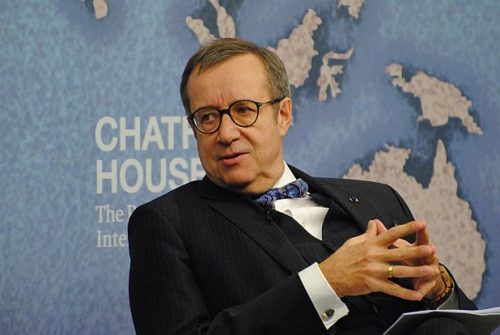
Past President Toomas Ilves of Estonia
community and for his speeches before the United Nations where he has fostered understanding of the risk of climate change, the need for safety of the Internet, and the plight of migrants and refugees – especially children.
In making the announcement Gov. Michael Dukakis, Chairman of Boston Global Forum, stated, “We believe we are kindred spirits in our pursuit of a world in which we share in the concern for our fellow citizens worldwide.”
He added, “I also believe the Boston Global Forum and the Michael Dukakis Institute for Leadership and Innovation can play a vital role in helping President Ilves continue to communicate his message and inspire others by participating with leading thinkers and scholars from Harvard and MIT who share his vision for a clean, safe and transparent Internet.
Coverage is invited by preregistering with Dick Pirozzolo, media liaison director, at [email protected].
Also being honored for contributing to the advancement of Artificial Intelligence and Cybersecurity will be Prof. John Savage as Distinguished Global Educator for Computer Science and Security on the 50 Anniversary of the Brown University Computer Science Department.
This year’s conference theme is Cyber-Defense Strategy for a Nation, featuring discussions by noted world authorities:
“Can We Develop Norms to Control Cyber Conflict?” by Prof. Joseph Nye
“A Cyber-Defense Strategy for a Nation” by Prof. Nazli Choucri
“Applying Estonia’s Cyber-Defense Strategy Internationally” by Estonia President Toomas Hendrik Ilves
Global Cybersecurity Day was created to inspire the shared responsibility of the world’s citizens to protect the Internet’s safety and transparency.
Boston Global Forum is a think tank with ties to Harvard University faculty, business leaders and journalists. It is chaired by former Massachusetts Gov. Dukakis, a national and international civic leader, and cofounder Tuan Nguyen, an internet authority and founder of VietNamNet, Vietnam’s largest online newspaper. The award recipients were selected by the board of directors of the Boston Global Forum and Michael Dukakis Institute for Leadership and Innovation: Gov. Michael Dukakis, Nguyen Anh Tuan, Prof. Thomas Patterson, Prof. David Silbersweig, Prof. Nazli Choucri and Prof. John Savage.
Media and press credentials contact:
Nguyen Anh Tuan, +1 617-286-6589, [email protected]
Dick Pirozzolo +1 617959-4613 [email protected]
About Boston Global Forum
Boston Global Forum is a public policy think tank that brings thought leaders to inspire creative and practical collaboration on solving problems that affect the world. Founded in December 2012, Boston Global Forum’s leadership includes former Massachusetts Governor Michael Dukakis; Thomas Patterson, the Bradlee Professor of Government and the Press and acting director of the Shorenstein Center on Media, Politics, and Public Policy at Harvard Kennedy School; and Nguyen Anh Tuan, founder and former editor-in-chief of VietNamNet, a top online newspaper in Vietnam, and founder of VietNet, the first Internet Service Provider in Vietnam.
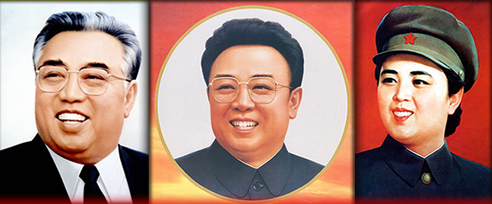
by dickpirozzolo | Oct 1, 2017 | News
By Nguyen Anh Tuan,
Cofounder, CEO of Boston Global Forum
Scholars and international relations authorities gathered at Harvard University recently to urge a diplomatic solution to the US-North Korean conflict and an end to the maelstrom of threats and personal insults. The symposium, organized by the Boston Global Forum (BGF) and the Michael Dukakis Institute for Leadership and Innovation as part of its annual World Reconciliation Day events here and in Japan, was moderated by former Massachusetts governor Michael Dukakis, who cofounded the BGF think tank in 2012.
Among the international relations authorities were Prof. Joseph Nye, Asst. Secretary of Defense during the Clinton Administration, who called for employing soft power diplomacy to reduce tensions with North Korea, and Prof. Sung-Yoon Lee of the Fletcher School of Diplomacy, Tufts University, who offered his analysis of North Korea.
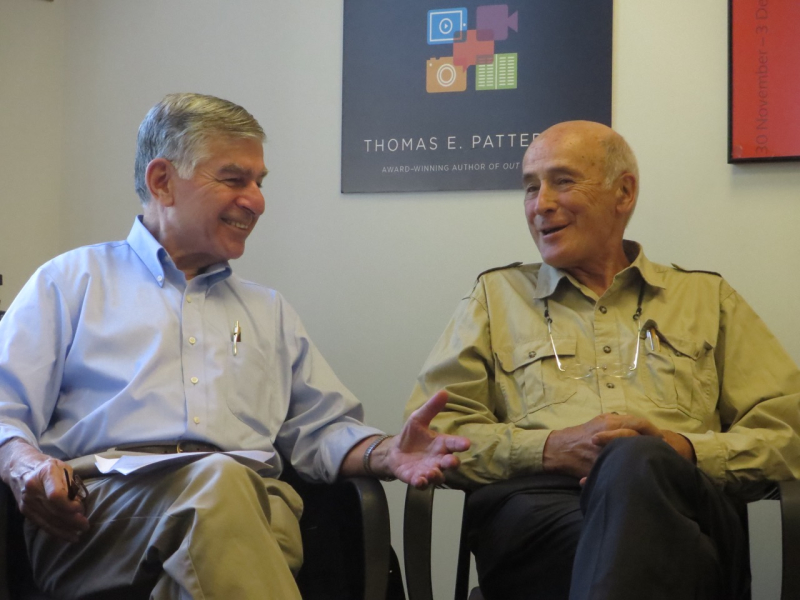 Gov. Michael Dukakis told the delegates, when rhetoric overshadows reason, “a single misstep can turn political brinksmanship into a global conflagration. Nowhere is there a greater risk today than with North Korea.”
Gov. Michael Dukakis told the delegates, when rhetoric overshadows reason, “a single misstep can turn political brinksmanship into a global conflagration. Nowhere is there a greater risk today than with North Korea.”
In keeping with the reconciliation theme, Nye told 20 delegates and journalists, “Reconciliation with friends means one thing, but in the case of North Korea, there is similar second level of reconciliation possible that means reduction of enmity, which is extraordinarily difficult when the President talks about turning North Korea into a sea of fire and fire and fury.”
Nye added, “We must be careful not to mistake reality for rhetoric. The North Koreans are not suicidal. North Korea is extremely rational — and has chosen a set of means to get to an objective of preserving the current regime.” He emphasized that while there is a low probability of nuclear war one must then ask. “is there a probability of conventional war?”
Historically, Nye added, “The temptation of escalation is always there. If you ask whether the Russian Tsar and German Kaiser intended a war in 1914 in which they would lose their thrones and their see their monarchies dismembered the answer is no. They expected a third Balkan war lasting for three weeks and never expected four years of armed conflict. Moreover, Japan did not act irrationally,” when it bombed Pearl Harbor. “If Japan had done nothing, the nation would have been strangled by a US oil embargo, so they hoped for short war believing it would be better than certain strangulation because of the embargo.”
While political hawks may be tempted, a decapitating strike against North Korea that seizes the nuclear weapons or kills Kim Jong Un does not seem realistic observed Nye, “Hospitality between North Korea and the US goes back to Kim Ill Sung who, in June of 1950, crossed the 38th parallel,” invading South Korea. Though hostilities ended 1953 with an armistice, both North and South Korea are technically still at war. “There have been seven decades of enmity with 100,000 North Korea troops remaining on the border,” and a highly militaristic society.
The hostilities over nuclear weapons began in 1993 when North Korea violated a treaty by reprocessing plutonium, which they at first denied and tried to cover up. When their deception was discovered, the country withdrew from the proliferation treaty rather than abide by its terms because North Korea believes nuclear weapons are the only way to preserve its existence. The North Koreans don’t believe America will treat them normally if they don’t have such destructive power. “So North Korea continues its tests, which included a thermonuclear bomb five-times more powerful than previous devices, and has a stated goal of miniaturizing the bomb so that, in a few years, they can credibly say they can hit the US.”
Is reconciliation possible?
Cultural commonality and exchanges can contribute to enemies becoming friends, or at minimum a reduction of enmity. North and South Koreans, for example, compete on the same soccer teams, and Kim Jong Un is enamored of American movies and presumably American popular culture.
Nye looked to other historical lessons, pointing to international security communities that have evolved to a point where there is no likelihood of war among, say, the Scandinavian nations or, in Western Europe, where war between Germany and France would be unthinkable today. “There are few examples of democracies, especially liberal democracies going to war. However, there is also no likelihood of North Korea developing into a liberal democracy.”
“in 1895 the US and Britain almost came to war,” says Nye adding that, “Britain accommodated the US because, with the rise of Germany and Russia, it could not accommodate instability in Europe and also police the Western Hemisphere. So the Brits swallowed their pride and accommodated the United States.”
Similarly, the US and China fought against each other in Korea in 1950 when China crossed the Yalu River and we demonized Red China. In 1964, the US, under Linden Johnsen, contemplated preemptive nuclear strikes against China, but finally by “1971 with Nixon’s visit to China, the US accommodated China to stem Russian influence and maintain the balance of power.”
Is it like the Cuban missile crisis?
“When The US and Soviet Union came close to war during Cuban missile crisis – the positive outcome was to demonstrate that the path we were on could potentially lead to disaster.” John F. Kennedy responded by delivering a speech in which he said we cannot continue on the path of extreme hostility with the Soviet Union and this resulted in the eventual signing of a treaty to reduce underground testing of nuclear weapons, followed by nuclear nonproliferation pacts with the Soviets such as the SALT and START talks. “While this led to a set of agreements that lowered tensions with Mikhail Gorbachev and Boris Yeltsin, tensions have reversed with current Russian leader Vladimir Putin.”
To negotiate effectively with North Korea, the US needs a reduction of enmity to assess what is realistic. “Appeasement is not a bad thing per se and there is nothing wrong with appeasement if you have assessed your opponent’s objectives and found they are willing to accept the status quo rather the being a revisionist nation that wants to kick over the table.”
What are the goals of North Korea — status quo or revisionist? If we miss-assess the goals, we lay out greater problems for the future. We did not understand Hitler’s goals but with China we can compete and have strong differences by largely accepting the framework of the current order, Nye points out.
“Now if North Korea is interested in the status quo— if they really want weapons to prevent an overthrow of the regime, a peace treaty will let the country grow economically, the nature of their society will change and the matter is relatively easily resolved,” according to Nye, who is quick to point out, “If they really are revisionist, then given the nature of the region, a family dynasty of three generations and a belief that they are the heart of the Korean people and want to unify the Korean people under the North,” then appeasement is not possible.
Unfortunately, US knowledge and its ability to assess the situation in North Korea is limited. Nye, said President Bill Clinton believed a North Korean regime that was presiding over starvation while a nation across the border was prospering would last only a decade. “We were wrong and should admit we do not know much about what goes on inside North Korea. Additionally, we have a record of failure and of US presidents drawing redlines and Americans accepting the unacceptable.” Nye said, adding, “North Korea exploits the power of weakness and uses it to bluff and take risks.”
Nye said, “I don’t see much prospect in the use of force and we can’t wait and let them have a nuclear weapon. In 1994 we contemplated a strike, but the South Koreans said no. Sanctions may have some effect but not get to the core” of changing the behavior of a government willing to see ten-percent of its population starve.
Add that to the fact that China’s ability to solve the problem is limited because President Xi Jinping does not want to cause chaos on its border with North Korea, so the options are not impressive. “However, a China centric approach with gradual reduction of tensions over time could work,” says Nye. The US would assure China of our limited interest in deposing Kim Jong Un, and China would use its leverage to prevent escalating the North Korean nuclear threat. “The US would then gradually relax sanctions and expect North Korea to integrate with the world.”
As part of the agreement, the US would offer a peace treaty calling for North Korea to stop testing or exporting of nuclear weapons and for their eventual elimination from the peninsula. At the same time, US would retain its deterrence capacity if North Korea doesn’t live up to the agreement. The best argument, says Nye, “The current policy has failed for 30 years so we could take some risks to get a recession of enmity. I propose this as a way to go this but the administration is not likely to follow.”
Llewellyn King, a nationally syndicated columnist and host of the PBS program “White House Chronicle,” took a pessimistic view. He doubted the status quo would hold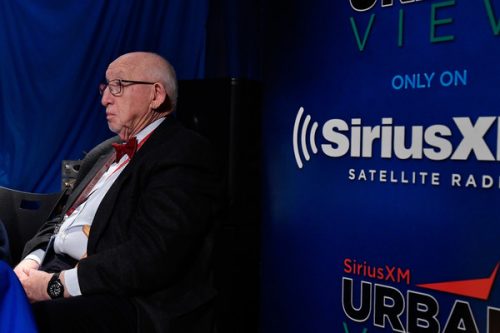 and suggested that there would be a “hard intervention” by the Trump administration. This, he thought, could be a missile shot down or some other action short of outright war. “Trump he said had been so belligerent in his remarks he must have directed the Pentagon to find a way of humiliating North Korea in the short term.”
and suggested that there would be a “hard intervention” by the Trump administration. This, he thought, could be a missile shot down or some other action short of outright war. “Trump he said had been so belligerent in his remarks he must have directed the Pentagon to find a way of humiliating North Korea in the short term.”
Tufts University Prof. Sung-Yoon Lee of the Fletcher School of Diplomacy and an authority on the Korean Peninsula stated that he is not so sure Kim Jong Un will be satisfied with the status quo. “North Korea is a revisionist state whose greatest threat is the fact that across the border we have a legitimate, pleasant alternate Korea that serves as a magnet for 30,000 North Koreans who have escaped to the South. This enormous wealth disparity between two countries sharing a border is the challenge North Korea cannot overcome.”
Lee, who is the Kim Koo-Korea Foundation Professor of Korean Studies at Tufts, added this trajectory does not favor North Korea becoming the legitimate sole government for a unified Korean state and “calls into question why North Korea’s continuing existence is necessary,” in an environment that has fostered South Korean economic development during seven decades of freedom and prosperity. “Most regrettable is the extreme suffering of the North Korean people and crimes against humanity committed by the Kim Jong Un regime, which according to a UN study, have no parallel in the world.” If these conditions are acceptable, then the status quo is extremely better than increasing the risk of war by a US preemptive strike. Will the status quo hold for the next decade and will more Americans reconcile to a nuclear North Korean state across the border of South Korea?
Lee said he expects North Korea to continue to menace South Korea, kill South Koreans, murder Americans from time-to-time such as it did with two officers they hacked to death when they went to trim a tree in the demilitarized zone or when, in 1969, North Korean jets shot down a US spy plane killing all 30 airmen aboard. We did not respond militarily at the time and then four months later the North Koreans shot down an American helicopter, killing three American military people.
Said Lee, “We have spoiled and conditioned North Korea to feel it can get away with murder. We have not put pressure on the regime sufficient to reduce its aggression.” The regime even managed to hold the US hostage by effectively censoring a satirical movie about the assassination of its leader. Sony, producer of the film The Interview, gave into North Korean demands after the regime hacked its computers by pulling the movie from theatrical distribution. In so doing North Korea was able to censor a nation that prides itself on free speech.
Post 9/11, the US Treasury found alternate ways to choke off the money supply to Iran by targeting the banks it dealt with in a bid to get their leaders to the bargaining table. The strategy worked and Lee suggested employing the same treatment with banks doing business with North Korea. Simply put, the US gives the bank a choice, continue doing business with North Korea or face the prospect of not being able to business in US dollars. The banks invariably agree to cooperate and those that cheat, face crushing fines.
Both the banks and North Korea favor the US dollar over other currencies giving the US tremendous leverage on this score and we have seen some progress on the financial front. Lee also believes China is likely to support these measures. “Awareness that this will work is no guarantor of sustained financial pressure. There is always the risk that Trump will accept political expedience over sanctions that will take at least three years to be effective.”
Though solutions to the crisis are not easy, discussions such as those being held by Boston Global Forum, in which cooler heads gather to develop and propose reasoned and peaceful solutions is a step in the right direction.
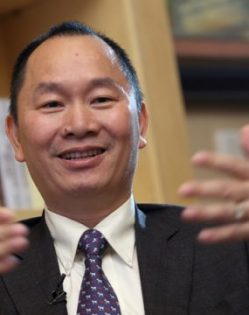
Nguyen Anh Tuan, author cofounded Boston Global Forum with Michael Dukakis
Established in 2012, The Boston Global Forum brings together, in an open and accessible public forum, an eclectic and engaging spectrum of highly regarded academic leaders, real-world experts, thought leaders, media experts and promising young leaders.
BGF’s mission is to identify emerging threats to peace and stability around the globe, suggest realistic solutions, and identify possible actions that can be taken to avert armed conflict. The Forum’s ultimate goal is to lessen tensions, promote peace and security, and foster conditions that lead to greater social justice and broader economic prosperity.
Delegates are available for media interviews and comment by contacting the Boston Global Forum press office at 617-959-4613 or [email protected]
Gov. Michael Dukakis, Chairman of the Boston Global Forum; Prof. Joseph Nye, Distinguished Professor of Harvard University; Prof. Thomas Patterson, Harvard Kennedy School; Prof. David Silbersweig, Harvard; Prof. Nazli Choucri; MIT, Prof. Ezra Vogel; Harvard, Prof. Richard Rosecrance, Harvard Kennedy School; Prof. John Savage, Brown; Mr. Llewellyn King, White House Chronicle Producer and Host; Prof. Sung-Yoon Lee, Tufts University Fletcher School of Diplomacy; Mr. Allan Cytryn, Former CTO, Goldman Sachs; Prof. Derek Reveron, Naval War College; Mr. Dick Pirozzolo, Media Liaison; Member BGF Editorial Board; Rokuichiro Michii, Consul-General of Japan in Boston, and Michael Pizziferri, Delegate of the Quebec Government Office in Boston

 Artificial Intelligence or AI in the context of human values and for the benefit of mankind.
Artificial Intelligence or AI in the context of human values and for the benefit of mankind.
 believe we are kindred spirits in our pursuit of a world in which we share in the concern for our fellow citizens worldwide. I also believe the Boston Global Forum and the
believe we are kindred spirits in our pursuit of a world in which we share in the concern for our fellow citizens worldwide. I also believe the Boston Global Forum and the  “Today 4.2 billion people are online using computers that are 3.5 billion times more powerful than when online communication started out 25 years ago with 3,500 academics who were using BITNET, the 1981 precursor to the modern Internet.”
“Today 4.2 billion people are online using computers that are 3.5 billion times more powerful than when online communication started out 25 years ago with 3,500 academics who were using BITNET, the 1981 precursor to the modern Internet.” Google and Tesla are within a one mile radius, “When I went to register my daughter for school I had to bring an electric bill to prove I lived there. It struck me that everything I experienced was identical to the 1950s save for the photocopy.”
Google and Tesla are within a one mile radius, “When I went to register my daughter for school I had to bring an electric bill to prove I lived there. It struck me that everything I experienced was identical to the 1950s save for the photocopy.” “In Estonia, we could not have a centralized database for economic reasons. Every ministry has its own servers, but everything is connected to everything else including your identity.” Even if someone breaks into the system, the person “is stuck in one room and cannot get into the rest of the system.”
“In Estonia, we could not have a centralized database for economic reasons. Every ministry has its own servers, but everything is connected to everything else including your identity.” Even if someone breaks into the system, the person “is stuck in one room and cannot get into the rest of the system.”
 Nye explained that “a norm is a collective expectation of a group of actors. It is not legally binding, and differs from international law. Norms can also be common practices that develop from collective expected behavior and rules of conduct.”
Nye explained that “a norm is a collective expectation of a group of actors. It is not legally binding, and differs from international law. Norms can also be common practices that develop from collective expected behavior and rules of conduct.” Nazli Choucri, Professor of Political Science, MIT and Director,
Nazli Choucri, Professor of Political Science, MIT and Director, 
 During the meeting, Tuan Nguyen introduced the launch of the Artificial Intelligence World Society, an offshoot of the Michael Dukakis Institute for Leadership and Innovation.
During the meeting, Tuan Nguyen introduced the launch of the Artificial Intelligence World Society, an offshoot of the Michael Dukakis Institute for Leadership and Innovation.





 Gov. Michael Dukakis told the delegates, when rhetoric overshadows reason, “a single misstep can turn political brinksmanship into a global conflagration. Nowhere is there a greater risk today than with North Korea.”
Gov. Michael Dukakis told the delegates, when rhetoric overshadows reason, “a single misstep can turn political brinksmanship into a global conflagration. Nowhere is there a greater risk today than with North Korea.” and suggested that there would be a “hard intervention” by the Trump administration. This, he thought, could be a missile shot down or some other action short of outright war. “Trump he said had been so belligerent in his remarks he must have directed the Pentagon to find a way of humiliating North Korea in the short term.”
and suggested that there would be a “hard intervention” by the Trump administration. This, he thought, could be a missile shot down or some other action short of outright war. “Trump he said had been so belligerent in his remarks he must have directed the Pentagon to find a way of humiliating North Korea in the short term.”